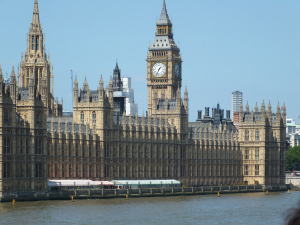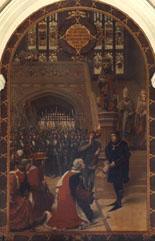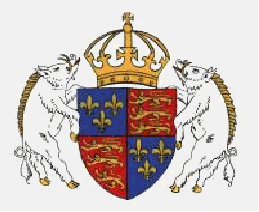Matthew Lewis's Blog, page 7
April 10, 2014
Why Would Richard III Do It?
Having considered in a previous post what it might mean if King Richard III had killed his nephews, it is worth considering what he actually stood to gain from committing the deed. Many will insist that clearing a path to the throne was motive enough, but I don’t think it’s quite that simple.
The document by which Richard’s title was presented, later to be accepted by Parliament, was Titulus Regius. The Parliament Rolls of January 1484 recall that the document was presented to Richard “on behalf and in the name of the three estates of this realm of England, that is, the lords spiritual and temporal and the commons”. However, the Rolls note that as Parliament was not officially in session at the time “various doubts, questions and ambiguities are said to have been prompted and engendered in the minds of various people” as to the legitimacy of the document. To correct this, the document was read before Parliament and enrolled as an Act of Parliament to remove this confusion. In spite of the best efforts of Henry VII to have all copies of the documents destroyed, it has remained for us to examine.
The petition refers to the misrule of England of late, particularly since “the ungracious feigned marriage, as all England has reason to say”, between Edward IV and Elizabeth Woodville, “lately and for many years previously calling herself queen of England”. The bill details Edward IV’s supposed pre-contract of marriage to Eleanor Butler, a daughter of the Earl of Shrewsbury, stating “If all that is true, as in very truth it is, it clearly appears and follows that during his life the said King Edward and the said Elizabeth lived together sinfully and damnably in adultery, contrary to the law of God and of his church”, adding also that “it clearly appears and follows that all the issue and children of the said King Edward are bastards, and unable to inherit or claim anything by inheritance, by the law and custom of England”. The first important matter of note here is the reference to “all the issue and children”. This was not aimed specifically at the title of Edward V or his brother, but included his sisters as well as any other known bastards of Edward IV.
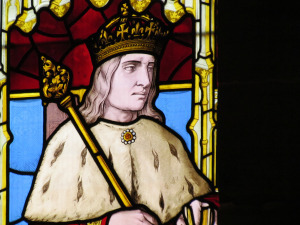
King Edward IV
The issue of the young Edward, Earl of Warwick, son of George, Duke of Clarence, and his sister Margaret was dealt with by the recollection that “by the three estates of this realm assembled in a parliament held at Westminster in the seventeenth year of the reign of the said King Edward IV [1478], he then being in possession of the crown and royal estate, by an act made in the same parliament, George, duke of Clarence, brother to the said King Edward, now dead, was convicted and attainted of high treason”. The effect of George’s attainder was that “all the issue of the said George was and is disabled and barred from all right and claim to the crown and royal dignity of this realm”.
The effect of all this, some will maintain to Richard’s delight, was that “there is no other person living, except you, who by right may claim the said crown and royal dignity by way of inheritance”. The Parliament Rolls then record that “This bill was conveyed to the commons of the realm of England being in the said parliament; to which bill the same commons gave their assent in these words: A cest bille les comenz sount assentuz. (To this bill the commons are agreed.)”
Richard was king and his title was indisputable. Or was it? This is the real crux of the issue regarding the Princes in the Tower. If Richard’s title was beyond challenge, the boys posed little threat. Yes, a few may risk the treachery of treason, but the threat of the fate that awaited failure should put off most. When Henry Tudor won the crown at Bosworth, he dated his rule from the day before the battle to allow those who fought for Richard to be convicted of treason. A travesty of justice, but an effective way of dealing with their threat. Henry knew what Richard must have also known; that which had been won could be lost; that which had been handed to them could as easily be snatched away and given to another. Henry’s title was far from incontrovertible and so was Richard’s. As Parliament had granted him his title, so it could be granted to another, or back to Edward V. The last twenty years had demonstrated as much clearly.
So, in spite of being declared illegitimate, it is entirely conceivable that the Princes in the Tower were viewed as a potential threat to Richard’s rule. There were several possible solutions to this problem, only one of which, the most extreme, was to have them murdered. What would Richard actually gain from doing away with a 12 year old boy and his 9 year old brother? The usual answer is the easy one. Removing the boys would eliminate the threat of a revival of the cause of Edward V. But that is not the whole picture.
Edward had never been crowned, though he still holds the title King Edward V. He was not a king anointed by God as Henry VI had been when he was displaced. There was familial loyalty, but by recognising him as a bastard in Parliament, the lord spiritual and temporal and the commons renounced that loyalty. Officially at least. There is also another consideration.
Salic Law was the system in France that prevented inheritance by the female line of any family. It was a clear and established legal principle. No such law existed in England. It is true that primogeniture traditionally meant that the oldest male inherited, but there was nothing to prevent female inheritance. Plenty of titles were held at this time by well known lords jure uxoris – by right of his wife. The famous Earl of Warwick, the Kingmaker, only held that earldom by right of his wife Anne de Beauchamp. Anne’s brother Henry died with only one daughter, another Anne. When she died childless, the title passed to his sister Anne as 16th Countess. Warwick’s title was not truly his.
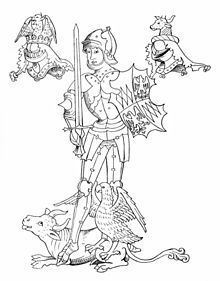
Richard Neville, Earl of Warwick (jure uxoris)
It can also be acknowledged that there was a history in England of shying away from female rule. Matilda had suffered from the perception that women should not rule men and more recently Margaret of Anjou’s attempts to secure power for herself during her husband’s incapacity had pushed men into the arms of Richard, Duke of York. In contrast to this, Henry Tudor was to claim the throne and have himself crowned King Henry VII before he married Elizabeth of York precisely because he knew her title to the throne was better than his and he did not want to restore the House of York to act as a consort to the Queen. He wanted the crown for himself.
So, the real question is this; were the other royal children really any less of a threat than Edward V and Richard, Duke of York? The answer is plain. How did Henry VII recruit disaffected Edwardian Yorkist support? By promising to marry Elizabeth of York, the oldest daughter of King Edward IV. It was the promise of a union with the House of York that bought Henry his throne because men clearly identified Elizabeth as the rightful heir in her brothers’ absence. That was precisely the reason Henry was careful to have himself crowned in his own right, not that of his intended wife. Parliament eventually petitioned Henry to honour his pledge and he was forced to accept that there was no way to maintain his position without doing so. Whether he liked it or not, because he would not claim the crown by right of conquest, he was effectively king jure uxoris.
This situation did not suddenly surface just before Bosworth, either. On Christmas Day 1483, Henry Tudor swore an oath at Rheims Cathedral to marry Elizabeth in return for the support of those men gathered around him in seeking the throne. Elizabeth was now a very real threat in the way that her brother might have been. If Richard had ordered the murders of the two boys just a few months earlier, the natural course of action now was to finish the job and do away with Edward IV’s daughters too, robbing Tudor of the allegiance of those who had made oaths to him by removing the possibility of a union. If Richard did not care about two boys, why care about five girls languishing in sanctuary?
Yet this did not happen. In March 1484, less than three months after Henry Tudor’s oath, Elizabeth Woodville and her daughters emerged from sanctuary and came to Richard’s court as part of his family. He had sworn a public oath to protect them and to find them suitable marriages. This episode is a crucial part of the story but remains as elusive as so many others. It is often asked how Elizabeth Woodville could possibly have handed her daughters into the care of a man who had murdered her sons. Would his promise really be enough if she believed he had done away with her sons? Of course, it is also argued that Richard may well have shown her proof either that he was not responsible for the boys’ death or even that they weren’t dead at all. There is a Tyrell family story that Sir James Tyrell hosted Elizabeth and her daughters at his family home at Gipping Hall when she met her sons on frequent visits arranged by Richard. It has been argued that Elizabeth had little option but to come out of an indefinite sanctuary, but I would have thought remaining there was preferable to risking the lives of her remaining children, particularly if Henry Tudor was intending to rescue them.
Perhaps we should also be asking the opposite question. If Richard had murdered his nephews, the greatest, most immediate threat to his rule was now Henry Tudor, who had attempted one invasion already and would surely try again soon. He was drawing support to him based upon his promise to marry Elizabeth, a woman who was now in Richard’s hands. If he had murdered her brothers, surely he would have no qualms about killing her and her sisters now. He had promised not to, but if he was a murdering monster, what would that promise really be worth, especially against the opportunity to secure his position further? Killing Elizabeth would not be enough – Tudor could simply transfer his oath to Cecily. The others were too young, but in time they would become the same threat. Why not simply dispose of the whole lot right away? That would be the natural response if Richard were an evil schemer.
But the girls lived. Richard fulfilled his promise, at least until his death the following year. Perhaps he would have survived longer had he been the brutal murderer many cannot see past. Mind you, that would still not be enough.
George, Duke of Clarence had a son, Edward, Earl of Warwick and a daughter, Margaret. In the absence of other Yorkist possibilities, they may have become a threat. The Edwardians who were drifting away from Richard may have focussed on Edward as the heir of York in spite of his father’s treason. Margaret might even have become a focus for Tudor if Edward IV’s daughters were all gone. No. They would have to go too. Yet it was Henry VII who was to judicially murder Edward, Earl of Warwick and it was Henry VIII who finally succumbed to paranoia and executed Margaret when she was an elderly lady of 67.
The early Tudors would also feel the threat from Richard’s other nephews, the de la Pole sons of his sister Elizabeth. They carried the cause of the White Rose into the reign of Henry VIII, so were legitimate threats, but John was killed at the Battle of Stoke in 1486, Edmund was imprisoned by Henry VII, handed over on the promise that he would not be executed, and was beheaded in 1513 by Henry VIII, who did not feel his father’s promise bound him. Richard was killed at the Battle of Pavia in Italy, news that Henry VIII enthusiastically celebrated, having been unable to catch him, and William was imprisoned in the Tower of London in 1501 and remained there until his death 37 years later. He remains the longest serving prisoner in the history of the Tower.
So, Richard did not kill any of these people. We know this for a fact, in spite of the often potential and even very real threat that they posed to him. Why, then, is it so easy to believe that he murdered the Princes in the Tower? Two out of at least nine, if not more, threats? Why do far less than half a job if securing the throne is your only concern?
The other suspects? Well, these tend to all orbit the cause of Henry Tudor. If they were murdered in 1483, it is possible that it was part of a plot to subvert Richard’s rule by casting the shadow of guilt over him.
Henry Stafford, Duke of Buckingham was a cousin to Richard and had helped to propel him to the throne. In spite of this, and the rewards that followed, Buckingham apparently wrote to Henry Tudor in exile imploring him to invade to free the sons of Edward IV, quickly altering the purpose of the invasion to seeing Tudor crowned king because there were rumours that the boys were dead. Did Buckingham start these rumours in spite of knowing them to be false? Did Buckingham, with all of his power and influence, arrange the boy’s death and invite an invasion to allow Richard and Tudor to destroy each other, clearing his own path to the throne? His blood was royal and he possessed a claim stronger than Tudor’s. The Stafford line was descended from the daughter of Thomas of Woodstock, Duke of Gloucester, son of Edward III. Buckingham’s mother was Margaret Beaufort, daughter of Edmund, Duke of Somerset, and so a cousin of Henry Tudor’s mother. The rebellion’s failure cost him his life and cast a long shadow over his son, who was to fall foul of Henry VIII’s early suspicious nature.
Margaret Beaufort, Tudor’s mother, was married to Thomas, Lord Stanley who was Richard’s Lord High Constable after Buckingham’s fall. This role effectively gave Stanley the keys to the Tower. Was the prospect of seeing a grateful step son on the throne enough to drive the murder of two young boys? It was certainly enough to betray his king on the field of battle at Bosworth, though this seems a risky move for a man famed for walking the fine line of self serving loyalty. Perhaps his wife was more driven and convinced him, or had the deed done herself. She was a staunch Lancastrian who had seen Henry VI killed, his son lost in battle to the Yorkists, her own family, particularly anyone brave enough to bear the title Duke of Somerset, decimated by the bitter Wars of the Roses. Was this revenge, then? She had opportunity and motive, as did Stanley and Buckingham. And, lest we forget, Richard himself.
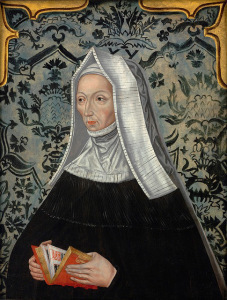
Lady Margaret Beaufort
Unless, as I continually return to, they did not die at all. Elizabeth Woodville may have emerged from sanctuary on the promise of contact with her sons, safely secreted in Richard’s old stomping grounds in the north among men he knew he could trust. Away from court, brought up as his illegitimate nephews. Or perhaps they were quietly installed at the Burgundian court of their aunt, Richard’s sister Margaret, travelling to Gipping Hall to visit their mother under the trusted supervision of Sir James Tyrell.
The frustrating thing is that we may never know the truth, but the possibilities beyond Richard killing two young boys, members of his own family, must bear thinking about, if only so that we consider the whole realm of potential fates. If your final assessment is still that Richard was still the most likely suspect to have had the boys murdered, then I am happy for you to reach that conclusion. He probably is the most reasonable suspect, but too much still does not make sense.
He doesn’t seem the type of man to do half a job.
Take Our Poll
Matthew Lewis is the author of a brief biography of Richard III, A Glimpse of King Richard III along with a brief overview of the Wars of the Roses, A Glimpse of the Wars of the Roses.
Matt’s has two novels available too; Loyalty, the story of King Richard III’s life, and Honour, which follows Francis, Lord Lovell in the aftermath of Bosworth.
The Richard III Podcast can be subscribed to via iTunes or on YouTube
Matt can also be found on Twitter @mattlewisauthor.


March 21, 2014
The Richard III Podcast – Episode 3 – The Coronation of King Richard III
Episode 4 of The Richard III Podcast looks at the coronation ceremony of King Richard III and what the lavish ceremony can tell us about the beginning of this most infamous king’s reign.
Download: the-richard-iii-podcast-episode-003-the-coronation-of-king-richard-iii.mp3
Matthew Lewis is the author of a brief biography of Richard III, A Glimpse of King Richard III along with a brief overview of the Wars of the Roses, A Glimpse of the Wars of the Roses.
Matt’s has two novels available too; Loyalty, the story of King Richard III’s life, and Honour, which follows Francis, Lord Lovell in the aftermath of Bosworth.
The Richard III Podcast can be subscribed to via iTunes or on YouTube
Matt can also be found on Twitter @mattlewisauthor.


March 18, 2014
The Richard III Podcast – Episode 2 – The Cat Who Got The Cream
Welcome to this instalment of The Richard III Podcast, which looks at the story of the illegitimacy of the Princes in the Tower and a potential new suspect in their fate.
Download: the-richard-iii-podcast-episode-2-the-cat-who-got-the-cream.mp3
Matthew Lewis is the author of a brief biography of Richard III, A Glimpse of King Richard III along with a brief overview of the Wars of the Roses, A Glimpse of the Wars of the Roses.
Matt’s has two novels available too; Loyalty, the story of King Richard III’s life, and Honour, which follows Francis, Lord Lovell in the aftermath of Bosworth.
Matt can also be found on Twitter @mattlewisauthor.


March 9, 2014
The Richard III Podcast – Introduction
This introductory episode of the Richard III Podcast offers an overview of the life of King Richard III upon which future episodes will expand.
Download: the-richard-iii-podcast-introduction.mp3
Matthew Lewis is the author of a brief biography of Richard III, A Glimpse of King Richard III along with a brief overview of the Wars of the Roses, A Glimpse of the Wars of the Roses.
Matt’s has two novels available too; Loyalty, the story of King Richard III’s life, and Honour, which follows Francis, Lord Lovell in the aftermath of Bosworth.
The Richard III Podcast can be subscribed to via iTunes or on YouTube
Matt can also be found on Twitter @mattlewisauthor.


March 4, 2014
The Richard III Podcast – A Perfect Coup
Welcome to the first episode of The Richard III Podcast, which details the events surrounding Richard’s arrival in London in May 1483. The podcast largely follows my blog post, A Perfect Coup.
Download: richard-iii-a-perfect-coup-final.mp3
Matthew Lewis is the author of a brief biography of Richard III, A Glimpse of King Richard III along with a brief overview of the Wars of the Roses, A Glimpse of the Wars of the Roses.
Matt’s has two novels available too; Loyalty, the story of King Richard III’s life, and Honour, which follows Francis, Lord Lovell in the aftermath of Bosworth.
Matt can also be found on Twitter @mattlewisauthor.


February 14, 2014
King Richard III – The Movie
Well, I’ve done something monumentally stupid and potentially embarrassing but I couldn’t resist. Would you like to help me create a movie of the life of King Richard III? Oh, you would? Maybe it’s not so stupid after all!
I have created a Kickstarter project to ask for funding to make a movie of the life of King Richard III which will present facts to counter the Shakespearean monopoly on his story. The script is based upon my novel Loyalty and will seek to present Richard as a real man, not a saint but not Shakespeare’s twisted villain either. We will follow him as he desperately tries to make his way through one of the most complex and deadly periods of English history.
Here is the link to the project: https://www.kickstarter.com/projects/559714318/loyalty-the-story-of-king-richard-iii
It has amazed me that a film like this has never been attempted. When the remains of this infamous king were uncovered in 2012 and confirmed as his in February 2013, I was convinced a Hollywood epic was on the way. Perhaps even a whole raft of them. I waited. Then I waited some more. Then I wondered what I was waiting for and decided it was time, with your help, to try and make this happen.
What is Kickstarter?
Kickstarter is a crowd funding platform. Any idea can be created as a project and the project requests funding from those interested to meet a target to facilitate the aim of the project. In this case the project is our movie and I am asking for your help to make it happen.
How It Works
Firstly, your risk is limited. If the project doesn’t reach its funding target, no one contributes anything. At that point all pledges are cancelled. You only pay anything if the project attains its target and the film is going to be made. The target for this is huge. In terms of movie budgets it is tiny, the smallest amount my research suggests is feasible to make a film worth making, but in terms of the real world, it is a vast sum. Still, I wanted to have a go at telling this important and fascinating story which could reach out further than anyone has before to press for a re-examination of this king’s lost reputation.
Whilst the project will collapse if underfunded, it can be oversubscribed. If the target is reached pledges can still be made and the amount is unlimited. So, if this project is overfunded, the budget for the film goes up and it will be even bigger and better.
For each level of contribution there is an associated reward to thank you for the pledge and to offer an incentive. I have been cautious not to make those rewards expensive or undeliverable because this is really about making the movie and that is where the money will need to go to be successful.
What Are The Risks?
The most obvious risk is that I have never made a movie before and the budget it very tight. However, I wouldn’t be asking for your help if I didn’t really and truly believe that this is an achievable goal and an opportunity to be seized. Through attention to detail and to the budget we could make a superb film that will redefine the reputation of King Richard III around the world for generations to come. Is that worth a pledge you won’t have to pay if the project fails to meet its funding goal? That is up to you. It takes a couple of minutes to sign up and pledge if you want to be a part of this. If you have any questions please don’t hesitate to ask me.
So there it is. I did it. The project’s success is now firmly in your hands. Please spread the word as widely as you are able. Tell everyone! Together we can recreate the final, glorious cavalry charge of King Richard III and his knights to send a shiver down spines around the world.
Matt


The Cat Who Got The Cream
In my last blog post, A Perfect Coup, I discussed the situation that Richard III, as Duke of Gloucester and Protector of the Realm, may have found when he arrived in London in the summer of 1483. The one glaring issue that I didn’t address was the development of the story of the illegitimacy of the Princes in the Tower. So here goes…
The issue of the execution of Hastings, Rivers, Grey and Vaughn has been inextricably linked to the declaration of the illegitimacy of the sons of King Edward IV, but what if that were a mistake? The executions have been regarded as brutal measures employed by Richard to clear a path to the throne; the declaring of the boys’ illegitimacy being the end game to which this process had aimed. Applying hindsight, it is easy to muddle events and apply an overarching scheme to events which may have been very separate at the time. If Richard arrived in London to find a squabbling mess and tried to resolve it, what if this was just another devastating piece of news to be dealt with? And what if someone unexpected was pulling the strings?
One of the biggest mud pies thrown at the story of the Princes’ illegitimacy is its convenience to Richard. I would argue that it was far from convenient, but many will see only Richard’s ambition. For now, it is enough to understand that a pre-contract of marriage was, in medieval England, under canon and common law, a marriage as though a church ceremony had taken place. Saying “I will marry you” was the precise equivalent of saying “I do” before an altar. If, therefore, a pre-contract existed it would, without doubt or room for argument, make the marriage of Edward IV and Elizabeth Woodville bigamous and any children of that union illegitimate and incapable of inheriting the throne.
Is it feasible that King Edward IV indulged in a clandestine ceremony equivalent to a marriage in his late teens and early twenties in order to get a lady, concerned for her own reputation and keen for a dream match, into bed? Well, yes. That is precisely how he became married to Elizabeth Woodville. I would not be surprised (though can only offer conjecture) if many women were wooed this way in those years but all remained silent to preserve a reputation that would otherwise be destroyed, to prevent their future marital prospects from being harmed and to avoid incurring the wrath of the young king. Perhaps Elizabeth Woodville was the last in a line, the one who simply would not remain quiet, or with whom Edward genuinely fell in love. Either way, they were married in secret with limited witnesses, including Elizabeth’s mother Jacquetta, and the union was kept secret for several months, even from his closest friend the Earl of Warwick. Did Edward hope to extricate himself but found that he had finally played the game one too many times and with one capable of matching him?
Whatever the truth, the notion that Edward may have engaged in such a practise would surely not have been alien or repugnant to the people of London. When Edward returned to reclaim his throne in 1471, Philippe de Commines believed Edward was welcomed by London because the City’s merchants hoped for repayment of the debts that he owed them and the City’s wives hoped to return to his bed. His carnal reputation served him well in 1471 but doomed his son in 1483. Without a doubt this background made the allegations against him far more plausible than they otherwise may have been.
To return to 1483; the Crowland Chronicle tells us that “It was set forth, by way of prayer, in an address in a certain roll of parchment, that the sons of king Edward were bastards, on the ground that he had contracted a marriage with one lady Eleanor Boteler, before his marriage to queen Elizabeth”. This sermon was delivered by Dr Ralph Shaa, half brother to the mayor of London on 22nd June 1483, the date set for the coronation of Edward V. The sermon was entitled ‘Bastard Slips Shall Not Take Deep Root’ and made public the alleged pre-contract of marriage. It appears that the sermon also questioned Edward IV’s own legitimacy, though this charge was swiftly dropped, whether for lack of truth, evidence or will to offend Duchess Cecily. It was also unnecessary if Edward’s children were proved illegitimate and Richard may still have wanted a relationship with his mother!
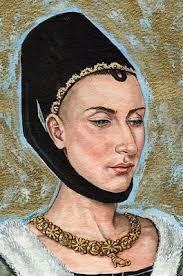
A Likeness Believed To Be Lady Eleanor Butler
The story was supposedly brought to Richard by Robert Stillington, Bishop of Bath and Wells. Claiming to have been a witness to the pre-contract, Stillington presented his evidence to a Parliamentary committee who believed in it enough to declare the boys illegitimate and request that Richard take the throne as the only legitimate male heir of York. It is frequently contended that this revelation was too well timed to be true, that it came from nowhere at just the right time to win the throne for Richard. But there is more to it than that. It was not such a well timed coincidence.
If the pre-contract were true, no one during Edward’s lifetime would bring the allegation into the light for fear of retribution from both the king and his queen, not to mention her family. A lady (or ladies) would also have to consider their own prospects should they announce such an embarrassing disgrace. Eleanor Butler died in 1468, but was alive when Edward married Elizabeth Woodville, so if the pre-contract were true there would be no doubt of bigamy. It seems likely that Edward’s death was required for this news to be made public.
In 1478, 5 years before his death, Edward V had executed his brother George for treason. George’s rap sheet was as long as any man’s arms and it is hard to say that he didn’t bring his fate upon himself, but I wonder whether it might have relevance to this story. The Parliament Rolls record the charge the king brought against his brother, stating “a conspiracy against him, the queen, their son and heir and a great part of the nobility of the land has recently come to his knowledge, which treason is more heinous and unnatural than any previous one because it originates from the king’s brother the duke of Clarence”. The charge adds that “He also said that the king was a bastard, not fit to reign, and made men take oaths of allegiance to him without excepting their loyalty to the king.” In 1478, Stillington was closely associated with George, Duke of Clarence. When Clarence was arrested Stillington was too and spent time confined in the Tower of London for unknown offences believed to have been in connection with George’s treason.
So, as early as 1478 we have a brother of King Edward IV plotting against the king, queen and “their son and heir”, questioning the king’s legitimacy, and we have Robert Stillington, Bishop of Bath and Wells closely enough associated with the plot to be imprisoned. George was also charged with retaining a copy of “an exemplification under the great seal of an agreement made between him and Queen Margaret promising him the crown if Henry VI’s line failed”, showing that he was seeking to assert a claim as the heir both of York and of Lancaster. Is it inconceivable that Stillington’s secret had found its way to the eager ears of Clarence and that this was what drove him to rebellion? Disposing of a clergyman was notoriously difficult and Stillington was eventually released.
If we step back in Stillington’s career, there is more coincidence. Edward IV married Elizabeth Woodville in 1464, when Stillington was an archdeacon and Keeper of the Privy Seal. In 1465 he became Bishop of Bath and Wells and in June 1467 he was appointed Edward’s Lord Chancellor, a role he held (excepting during the re-adeption of Henry VI) until 1473. It may mean nothing more than a steady career progression, but reward and promotion followed on from Edward’s wedding, perhaps because he knew Stillington held a secret that had to be preserved. After his dismissal as Lord Chancellor in 1473, Stillington seems to have grown close to George, Duke of Clarence, becoming embroiled in the duke’s treason by 1478 in a frustratingly unspecified manner. Perhaps it is unspecified because it would have destroyed Edward’s line if made public.

Wells Cathedral, burial place of Robert Stillington
There is another figure who may have been at play too. Why did Stillington seek out Richard in 1483? I find it hard to except the ‘happy coincidence’ or questions about why it did not arise earlier. I can’t imagine a circumstance before 1483 when it could have arisen. Warwick may not have known and Clarence was silenced if he was threatening to reveal this secret. So why then? Well, Edward was dead so Stillington could expect a degree of impunity, though could not be sure how Richard might react to his news. The succession was about to take place and Stillington was about to watch the coronation of a boy he knew to be illegitimate. Before then, when Edward was alive, it was not an issue. Now it was. Perhaps Stillington, into his sixties by 1483, presumed he wouldn’t live to see the matter become a problem and would be excused from dealing with it. Maybe George had bound him to reveal the secret when the time was right. Or just maybe Stillington didn’t seek out Richard. Perhaps Stillington was sought out to deliver this news. By who? The very man More accused of revealing Lord Hastings’ plot to Richard.
John Ashdown-Hill, in his book Eleanor: The Secret Queen, examines the issue of the pre-contract in great detail. One relationship that he picks out fascinated me and seems to fit in with the events of this and my previous post. Eleanor Butler nee Talbot was the daughter of John Talbot, 1st Earl of Shrewsbury, a veteran of the wars in France who had worked there alongside Edward’s father the Duke of York. John Talbot had a niece named Alice Talbot (c1390-1436) who married Sir Thomas Barre of Burford. One of their daughters, Jane, married, as his second wife, Sir William Catesby Snr, becoming step-mother to Sir William Catesby Jnr, the lawyer who may have reported against Lord Hastings to Richard. John Ashdown-Hill asserts that there is evidence that Eleanor and Jane knew each other quite well. On 4th June 1468 Eleanor gifted a manor at Fenny Compton to her sister Elizabeth and Sir William Catesby Snr was a witness to the document (Eleanor: The Secret Queen, J, Ashdown-Hill p140). Sir William Snr had been attached to the Lancastrian household and cause and may even have fought at Towton for Henry VI. His uncle Robert did and William was attainted after the battle and briefly exiled. Through the 1460′s Catesby Snr became attached to the Earl of Warwick and began to expand his land interests veraciously. At the readeption of Henry VI the combination of Warwick and Lancaster sang to Catesby and he was appointed Sheriff of Northamptonshire during the brief period. He was pardoned after Edward IV’s return and remained as Sheriff until his death.
So the Catesby family are linked in a professional capacity and by marriage to the Talbots and directly to Lady Eleanor Butler. Could Sir William Catesby Jnr have heard a Talbot family tale of Eleanor’s ‘marriage’ to the king? Could he or his father have been engaged to offer legal advice on the matter? Perhaps this ambitious family held onto the story until it could serve them best. If that were the case (though obviously it is beyond proof and can only ever be conjecture), and if Catesby informed against Hasting to Richard in search of self promotion, it is possible that he deemed the time right to seek out the old Bishop of Bath and Wells. He may have believed Richard would be pleased with the news that would make him king. Certainly his rewards flowed once Richard was king and he became a hugely wealthy landowner and powerful political being. Could Sir William Catesby have found Robert Stillington and encouraged him to bring this story to Richard? It would surely explain the ‘convenient’ timing. If Catesby believed that it would ingratiate him to Richard, could he even have fabricated the pre-contract, making a plausible case with believable evidence from an old family connection to the Talbots and dredging up Clarence’s old ally Stillington to add credibility?
It is impossible to know the truth of the pre-contract story at this distance. John Ashdown-Hill’s book is well worth a read on the subject. It is apparent that such an act is not beyond the bounds of Edward IV’s character, though to allow one or more pre-contracts to stand would have been incredibly reckless. Although the evidence is lost to us now, what was presented to Parliament was complete and convincing enough for them to find that Edward’s children were illegitimate. This much is irrefutable. It is impossible to tell how or from where the story originated. It may have been the true cause of George, Duke of Clarence’s downfall. Stillington may have kept his secret until conscience forced him into the daylight or William Catesby sought him out to tell his story. Richard may have had prior knowledge of the story, may have been shocked to hear it, or may have been party to its fabrication. We can never know and I will leave you to make up your own mind which of these seems the more likely.
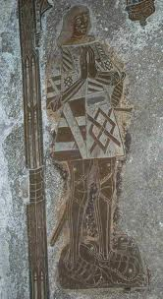
Sir William Catesby
I am left wondering one more thing. If Sir William Catesby was really behind the reporting of a plot by Lord Hastings to Richard and he was also at work in the emergence of the pre-contract story, what else was he willing to do to secure his position at the new king’s right hand? Is there another suspect emerging from this murky episode whose fingerprints might be found upon the fate of the Princes in the Tower? Did Catesby take a further step in his bid to win favour? If he sold out Lord Hastings and used an old story to procure the illegitimacy of a king, was he beyond arranging the deaths of two boys if he thought it would suit his new, all powerful, grateful and generous master? If he was involved, it would beg the question as to what Richard knew. Catesby’s rewards suggest he was not out of favour in any way, so either Richard did not know or he was complicit. Perhaps Buckingham lost faith with a man who couldn’t control his own lawyer, or maybe Catesby pinned the deed on Buckingham and Richard refused to believe that the Duke was innocent.
Or maybe none of this rings true.
What do you think?
Matthew Lewis is the author of a brief biography of Richard III, A Glimpse of King Richard III along with a brief overview of the Wars of the Roses, A Glimpse of the Wars of the Roses.
Matt’s has two novels available too; Loyalty, the story of King Richard III’s life, and Honour, which follows Francis, Lord Lovell in the aftermath of Bosworth.
Matt can also be found on Twitter @mattlewisauthor.


February 10, 2014
A Perfect Coup
That King Richard III seized the throne from his young nephew during the intrigue and confusion of the summer of 1483 is well known, as is the short, turbulent time that he was to spend upon the throne. Was Richard’s problem that his coup was, in fact, too good?
In early April 1483 King Edward IV, the first king of the House of York, lay on his deathbed aged 40 after over two decades as king, the second of which had seen more peace than the country had known in a generation. Although his death was coming early and his son was only a boy of 12, the peace that he had secured should have nurtured the Prince until he became a man. But all was not as it seemed.

King Edward IV
King Edward knew that strife lay ahead for his kingdom and for his son. Grafton’s Chronicle reports that as the king lay near to death he called about him his friends and family. “My Lords, my dear kinsmen and allies,” Edward reportedly began, “in what plight I now lye, you see, and I well feel.” There are other reports too of Edward pleading with those around him to unite for his sons’ sakes and to put aside their petty quarrels. He could see what was coming. “For it sufficeth not that you love them, if each of you hate other.” Lord Hastings, firmest of the king’s friends, was required to take the hand of his enemy Thomas Grey, Marquis of Dorset, the king’s step son, and swear that they would cease their rivalry. “Such a pestilent Serpent is ambition, and desire of vain glory and sovereignty,” Grafton reports that the king continued, “Ambition, which among states where once entered, creepeth so far forth, till with division and variance he turneth all to mischief. First longing to be next to the best: Afterward equal with the best, and at the last chief and above the best.” The sick king pleaded with those about him “from this time forward, all griefes forgotten, each of you love other, which I verily trust you will“, though it seems that he did not trust in this at all. When he could speak no more, Grafton tells how he “laid down on his right side, his face toward them: and none was there present that could refrain from weeping. But the Lords comforting him with as good words as they could … each forgave other and joined their hands together, when (as it after appeared by their deeds) their hearts were far asunder.” Edward was not blind, nor was he naive. This situation required a different solution.
The answer at which Edward IV arrived was that neither of these parties could be trusted with power, for they would, by nature of their hatred of the other, use the position against their enemies. His solution, on his deathbed, was to name his brother Richard, Duke of Gloucester, as Protector. It is often forgotten that this is the situation into which Richard was imported from his estates far in the north. There was hatred and bitter rivalry in London before he was summoned. That is why he was summoned. To believe that he created an atmosphere of edgy, nervous partisan politics is to ignore the fact that such an atmosphere already existed in London. Edward’s personality and intense likeability had been the glue that had held the parties together and without him, he knew that it could swiftly descend into conflict. For this, he must bear the blame. He had not prepared sufficiently for a world without him. In relying solely on his personality and not a less personal form of solid governance he denied his son safe stability. Perhaps less of an issue had it happened a few years later, he must have known that his death while he son was 12 was a recipe for certain disaster. No more could be done, and on the 9th April 1483, the tallest king in English history, King Edward IV, passed away.
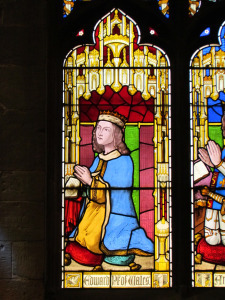
King Edward V
To my mind, this prevailing situation in London must colour our view of Richard’s role and his actions (which is different from excusing him of the worst crimes of which he is accused if he were guilty). Thomas Grey, Marquis of Dorset and half brother to the new king was supposedly bragging to the Council that his family held such power that they would rule without Richard. There must have been fear in the opposition camp that this was true because Lord Hastings wrote to Richard that he should come to London with all haste to stop the Queen’s family.
The new King Edward V was already in the care of his mother’s family, who had been a part of his household at Ludlow, led by his uncle Anthony, Earl Rivers. It is entirely possible, perhaps one might even concede reasonable, that Richard might fear that the Woodville family would indeed try to use their hold over the king to secure the authority that his brother had not wanted for them. They were generally disliked and mistrusted for their use of Queen Elizabeth’s position to secure some of the best positions at court and to corner the marriage market. They would have real reason to fear the loss of this position and if Richard believed the rumours of their posturing then securing the person of the king from them was the natural response. It matters less whether a Woodville plot against Richard was real or not than whether Richard had cause to genuinely believe it real. When Rivers overshot their agreed meeting place and took the king to a Woodville manor at Stony Stratford, that can only have served to add to Richard’s suspicion that some kind of plot may be very real.
What of Lord Hastings’ position in all of this? That he wrote to Richard pleading him to hurry to London suggests that he felt his own position weak. This would, to anyone’s eyes, make him dangerous. Even before his arrival in London, Richard must surely have been every bit as wary of Hastings and his motivations as he was of those of the Woodvilles. The execution of Lord Hastings is often viewed as the one undeniable blot on Richard’s character and reputation amid the fog of rumour. I am about to try and deny it, I’m afraid.
William, Lord Hastings was a close personal friend of King Edward IV, devoted to the cause of York. They shared good times and bad, food, drink and women, the last three to excess. Edward and Hastings famously both had Jane Shore as their mistress, as did the Marquis of Dorset, Edward’s step-son and Hastings’ rival. It is frequently asserted that Hastings was removed by Richard because of his fierce and unswerving devotion to his friend’s son, Edward V. It is claimed that Richard concocted a story of treason as an excuse to remove Hastings, who was a hurdle between him and the throne that he coveted. As with the Woodville plot, the question is less whether it was real and more whether Richard might have genuinely believed it to be.
Henry Tudor’s historian Virgil offers an interesting insight into this question. During the reign of Henry VII he wrote;
“But the lord Hastings who bore privy hatred to the marquis and others of the queen’s side, who for that cause had exhorted Richard to take upon him the government of the prince, when he saw all in uproar and that matters fell out otherwise than he had wenyd [wanted], repenting therefore that which he had done, called together unto Paul’s church such friends as he knew to be right careful for the life, dignity, and estate of prince Edward, and conferred with them what best was to be done. Here divers of them who were most offended with this late fact of Richard duke of Gloucester, adjudged it mete with all speed to procure the liberty of prince Edward, whom they accounted as utterly oppressed and wronged by force and violence, that so the fire, which was kindling, might be put out before it should spread further abroad.“
Was it Richard’s plan to seize the throne that caused such a desperate meeting? No. The matter that “fell out otherwise than he had wenyd” was the news that Richard had taken possession of the person of the king at Stony Stratford. This was precisely what Hastings had written to Richard to achieve, yet Virgil claims that on hearing of it, Hastings reaction was to call a meeting of powerful men to discuss what they might do against Richard on his arrival in London. Whilst Virgil may not be the most reliable source of unbiased information on Richard, he appears here to be offering substance to the notion that Hastings was plotting against Richard. Perhaps not against his life, but plotting nevertheless. Virgil concludes the matter of this meeting at St Paul’s by saying that “All the residue thought that there was no need to use war or weapon at all, as men who little suspected that the matter would have any horrible and cruel end.”
So, if Virgil is to be believed, most at the gathering did not share Hastings’ fear of Richard. The episode, if true, is perhaps reported to demonstrate Hastings precognition that Richard would turn to evil on arrival in London. What it in fact shows is that Hastings was measuring opposition against the Protector before he even arrived in London. If Hastings wished to preserve his own position, he may well have known that Richard, pious, priggish, upright Lord of the North, would not approve of Hastings lifestyle and may not wish that kind of influence upon his young nephew. Perhaps Lord Hastings had his own agenda that has been overlooked.
So it was that at a Council meeting in the Tower of London 13th June 1483 the deed was done. More recounts how Richard “came about nine o’clock to them, and having saluted all the lords very courteously, excused himself for coming to them so late, saying merrily, that he had played the sluggard this morning“. He jovially asked John Morton, the Bishop of Ely, for some of his “very good strawberries” for them to enjoy during the meeting.
“A little after this, the protector obliging them to go on in their councils, requested them to dispense with his absence awhile, and so departed. In the space of little more than an hour he returned again, but with such an angry countenance, knitting his brows, frowning and biting his lips, that the whole council were amazed at the sudden change. Being sat down, he said nothing for a good while, but at length spoke with great concern, and asked them this question : “What punishment do they deserve who had plotted his death, who was so near in blood to the king, and by office the protector of the king’s person and realm?” This question he had raised out of Catesby’s account of the Lord Hastings’s words and discourse, which he so represented to him, as if he had wished and contrived his death.”
Here, More, the supposed root of Richard’s criminal reputation, which he no doubt acquired tales of from John Morton himself, claims that William Catesby informed Richard that Hastings plotted against him. Catesby was a lawyer who had been in the service of Lord Hastings and who Richard had allegedly sent to sound out Hastings about Richard’s intention to seize the throne. It is reported that Catesby may never have actually raised the matter with Lord Hastings, but did report to Richard that Hastings would not join him. In fact, More is claiming here that Catesby in fact told Richard Hastings was plotting against him. So the question arises again: is it unreasonable to believe that Richard earnestly believed in a plot against him? If Hastings’ own man was informing him of one, it does not seem unreasonable.
Furthermore, Grafton reports that the night before this Council meeting, “Lord Stanley sent to him [Hastings] a trusty and secret messenger at midnight in all the haste, requiring him to rise and ride away with him“. It would seem that Stanley had endured such a nightmare about a crazed boar chasing him that he was convinced Richard, whose emblem was the boar, was out to get them. To this messenger, Hastings teased “leaneth my Lord thy master unto such trifles, and hath such faith in dreams, which either his own fear fantasiseth, or do rise in the night’s rest, by reason of the day’s thought. Tell him it is plain witchcraft to believe in such dreams, which if they were tokens of things to come, why thinketh he not that we might as likely make them true by our going, if we were caught and brought back, (as friends fail flyers) for then had the Boar a cause likely to raise us with his tusks, as folks that tied for some falsehood“.
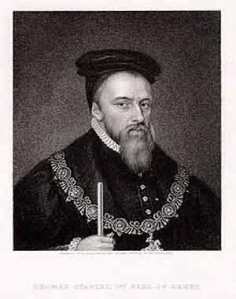
Thomas, Lord Stanley
Hastings advised against leaving lest they appeared guilty of some crime. If report of this reached Richard, what was he to make of these two discussing fleeing from London to their estates? Hastings had a large affinity in the East Midlands and Stanley could command an immense host from the North West. Could reports of this really be ignored, especially if they accompanied news of Hastings’ meeting at St Paul’s before Richard arrived.
Richard cursed Hastings as a traitor and had him dragged outside for execution, telling him “by Saint Paul, I will not dine till I see thy head off” (Grafton). Fabyan’s Chronicle reports that “there without judgement, or long time of confession or repentance, upon an end of a long and great timber log, which there lay with other for the repairing of the said Tower, caused his head to be smitten off“. Curiously, not allowing “long time” of confession implies that confession and last rites were in fact allowed, as it is often asserted they were not. As to the matter of “without judgement” there is an issue here too. Richard had, for many years, been Lord Constable of England, making him president of the Court of Chivalry and the Court of Honour. It is my understanding that the Constable was entitled to try matters without trial by peers based upon evidence that he had seen. I stand to be corrected if this is not true, but if it is, then Richard did not act illegally or outside of his jurisdiction by pronouncing judgement and sentence upon Hastings if he had evidence of a plot.
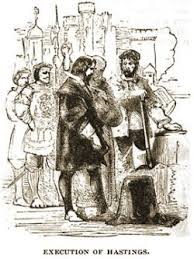
Execution of Lord Hastings
After the execution, Richard summoned the aldermen of London and, Grafton states, “Then the Lord Protector showed them, that the Lord Hastings and other of his conspiracy had contrived to have suddenly destroyed him and the Duke of Buckingham there the same day in council, and what they intended farther was yet not well known, of which their treason he had never knowledge before ten of the clock the same forenoon“. As with the evidence Richard presented to Parliament of his brother’s pre-contract and his nephews’ illegitimacy, many will claim that he invented the tale, but it is just as likely that he did not. London did not rise in opposition, perhaps because Richard showed them compelling evidence of the plots, the same evidence that he had been made aware of that morning, including, no doubt, Stanley’s call to Hastings to flee; evidence now lost to us.
In short order, the story of the illegitimacy of the Princes was circulated and Richard was asked to assume the throne. Having gone on at great length already, I will save the discussion of that matter for another time, but Richard was king. Earl Rivers, his nephew Richard Grey and Thomas Vaughn were executed at Pontefract. When Richard had arrived in London, Lord Hastings had supposedly congratulated him on securing the kingdom (for Edward V) without spilling so much as a thimbleful of blood. I can’t help wondering whether this very achievement ended up costing Richard his throne.
If he arrived in London in May 1483 to find a nest of vipers, a fraught atmosphere of plotting, intrigue and uncertainty, what should he have done? In short measure, Richard had dealt with it. He cut the heads from the two opposing factions; Lord Hastings and Earl Rivers. It is often assumed that he did so as part of a grand scheme to seize the throne, but what if he truly believed the plots were real and acted swiftly to prevent them progressing? This would explain why he continued to prepare for his nephew’s coronation, issuing edicts in the name of Edward V, minting coin for the new king and swearing his fealty repeatedly until the tale of their illegitimacy was given light. Perhaps it is hard to see the reversal of this man’s previous good character because it did not happen.
Thomas More also reports that during the Council meeting at which Hastings was arrested Richard bared his arm to show it withering, claiming witchcraft was being used against him. Since we now know that Richard did not have a withered arm , it is hard to know how much of these sources can really be believed, but it is intriguing that these are Tudor writers, trying to condemn Richard III, who in fact appear to give substance to the suggestion that he was surrounded by plotting.
That King Edward IV foresaw such turbulence from his deathbed is testament to the fragility of the peace that he had won and his realisation that without him it would not be likely to be maintained long. He would not apportion power to Woodville or Hastings, but turned to Richard, who he must have trusted to do what was required to resolve the tension. Would Edward IV have objected if he knew that the price of securing his son’s succession was the death of his best friend and his brother in law? I do not know. If any of the above has convinced you, then Richard was the right man for the job and Edward was only undone by his own previous wilful indiscretions.
The reason that I ask whether the coup was too perfect is that it was achieved with the death of four men; Hastings, Rivers, Grey and Vaughn. Edward IV took the throne after years of bitter fighting and battles that decimated the nobility and gentry. Perhaps if Richard had killed more people, crushed more potential opposition and allowed attrition to work for him, he would have better secured his throne. That he did not, and that he tried to make peace with the likes of Thomas Stanley, at least suggests that he was a more genuine character during the summer of 1483 than he is given credit for.
Matthew Lewis is the author of a brief biography of Richard III, A Glimpse of King Richard III along with a brief overview of the Wars of the Roses, A Glimpse of the Wars of the Roses.
Matt’s has two novels available too; Loyalty, the story of King Richard III’s life, and Honour, which follows Francis, Lord Lovell in the aftermath of Bosworth.
Matt can also be found on Twitter @mattlewisauthor.


January 23, 2014
William de la Pole – The Most Despised Man In England
As the sun rose on the morning of 2nd May 1450, it revealed a grisly sight on Dover beach. A headless body lay on the sand, dried blood staining the butchered neck. Beside the body, atop a stake, the vacant eyes of William de la Pole, 1st Duke of Suffolk stared out over the sea where he had met his fate, a fate that many felt he deserved. His family had risen from humble beginnings, a fact that had contributed to the odium that caused those of more noble families to turn their noses up at them. From such a height, the fall was devastating.
In the mid 14th century, William de la Pole, great grandfather of this duke, was a successful and wealthy wool merchant, lending money to the crown under Edward III. His sons enjoyed favour at the court of King Richard II, the eldest, Michael, becoming Chancellor on 1383 and being elevated to the peerage as Earl of Suffolk in 1385. Michael’s younger brother Edmund served in the prestigious position of Captain of Calais.
The family’s star was in the ascendant, but was closely aligned now with that of King Richard II. As his popularity plummeted, Michael took the brunt of the hatred as a figurehead of his government. Criticising God’s anointed king was not an option, and so his closest advisors must take the wrath of a nation. In 1387 the Lords Appellant accused him of treason and before the Merciless Parliament sat in February 1388, Michael fled to Paris, where he died the following year aged about 60.
Michael’s son, another Michael, father to our duke, was 22 when his father died and found himself without the lands and title that his father had been stripped of. He was more closely aligned to the Lords Appellant, which left him out of favour with Richard II. He fought for the restoration of his lands and properties over the years that followed his father’s death, finally being restored as 2nd Earl of Suffolk in 1398, shortly before Richard II fell. Although Michael heeded the Duke of York’s call to arms to defend the kingdom from Henry Bolingbroke, he eventually embraced the cause of Henry IV.
As a part of Henry V’s campaign in France, Michael died of dysentery in September 1415 at the Siege of Harfleur, not yet 50 years of age. Michael had been blessed with five sons and three daughters but the king’s efforts in France were to decimate his family after claiming his life. His oldest son, Michael, had travelled to France with his father and was one of the few notable English casualties at the Battle of Agincourt. Aged only 19, he had been 3rd Earl of Suffolk for only a month before his death.
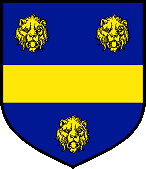
Coat of Arms of William de la Pole
William de la Pole became 4th Earl of Suffolk on his brother’s death. His other brothers were all to perish over the next two decades in France. Alexander was killed in 1429 at the Battle of Jargeau, the first encounter with a resurgent France led by Joan of Arc. John died a prisoner in France in the same year and Thomas perished while acting as a hostage for William.
When he returned to England, William grew ever closer to the meek and peaceable King Henry VI. By this time William was nearing forty and had been fighting in France for most of his adult life, almost twenty years. It would be interesting to know what this old soldier thought of his king, son of the Lion of England, but described as a lamb who had an acute distaste for war. Whatever their differences, Suffolk grew close to his king and, as his grandfather had done, he was soon to find his fortunes all too closely tied to a failing king.
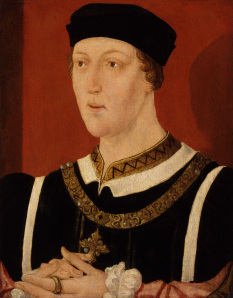
King Henry VI
Suffolk’s first major contribution to English politics was to organise a marriage for King Henry VI in 1444, by which time the king was 22. Suffolk selected Margaret of Anjou in a match that was to cause outrage. The king’s uncle Humphrey was dismayed that he intended to ignore the contracted union to the Duke of Armagnac’s daughter. Grafton wrote that “Humfrey Duke of Gloucester, Protector of the realme, repugned and resisted as muche as in him lay, this newe alliaunce and contrived matrimone: alleging that it was neyther consonant to the lawe of God nor man, nor honourable to a prince, to infringe and breake a promise or contract” (Grafton’s Chronicle (Richard Grafton) (1569) p624).
Baker wrote of the problems that this match created for Suffolk. “In the mean time the Earl of Suffolk, one of the Commissioners for the Peace, takes upon him beyond his Commission; and without acquianting his fellows, to treat of a Marriage between the King of England, and a Kinswoman of the King of France, Neece to the French Queen, Daughter to Rayner Duke of Anjou styling himself King of Sicily and Naples: In which business he was so inventive, that it brought an aspersion upon him of being bribed” (A Chronicle of the English Kings (Baker) p187). It was soon to be revealed that, due to the poverty of Margaret’s father, not only was there no dowry for the marriage, but Suffolk and the king had agreed to hand a quarter of England’s territory in France back by ceding Maine and Anjou. For his part in the arrangements, William was further elevated as Marquess of Suffolk.
After the death of John, Duke of Bedford in 1435 and the emergence of Henry VI’s personal distaste for fighting, the campaign in France had ground to a halt, frequently deprived of funding and commitment. It is possible that this situation led to Suffolk’s negotiation. Marriage to Margaret of Anjou, a niece of the French king Charles VII, would bring the peace that Henry craved. Giving back Maine and Anjou would sweeten the deal and might also have been intended to make English territory in France more manageable. If that was the intention, it was to fail spectacularly. The effect of the handover of the vast tracts of land was to embolden the French and lead them to seek to drive the English from France altogether. Suffolk was blamed for opening the door through which the English would be expelled from France so that within a few years only Calais remained in English hands.
The king’s uncle Humphrey, Duke of Gloucester died in 1447, with many believing that he had been murdered at the queen’s behest. Gloucester had been Protector during Henry’s minority and his loss saw the end of an era as the last son of King Henry IV passed. Suffolk, it seems, stepped into the void quite willingly, but suspicion grew all about him, not least that he had been the instrument of Humphrey’s destruction. By 1448 William had been created Duke of Suffolk, reaching the pinnacle of the nobility and attaining a title previously reserved for princes of the royal blood. His ascendancy was complete, and that brought him enemies.
One writer tells how “Many now recollected how stoutly the duke of Gloucester had stood up against the surrender of those provinces from which the king of France had made his attack” (History of England Volume II (A Clergyman of the Church of England) (1830) p524), further accusing Suffolk “of plotting to get the English crown into his own Family, by marrying his infant ward, Lady Margaret Beaufort, to his own son;- she being, they observed, the presumptive heiress of the royal house of Lancaster, as long as the king had no children.” William had married his son to the Beaufort heiress Margaret. Although the marriage was annulled by Henry in 1453, it drew accusations that by promoting Margaret as a potential heir to the throne while Henry remained childless, he was seeking to see his son made king. The unlikely scenario of her accession though suggests that the attraction may have been the same financial one that saw Edmund Tudor marry her soon after the annulment.
By 1450, Suffolk was unable to fend off the charges of treason any longer. He was accused of meeting with the French in an attempt to have England invaded. Baker wrote “That he had Traiterously incited the Bastard of Orleance, the Lord Presigny, and others to levy War against the King to the end that thereby the King might be destroyed; and his Son John who had married Margaret Daughter and sole Heir of John Duke of Somerset, whose Title to the Crown the said Duke had often declared, in case King Henry should die without issue, might come to be King.” (A Chronicle of the Kings of England (Baker) p189). Henry could no longer protect his favourite and even the indomitable queen could not save him. He was arrested and charged with treason. Before Parliament, a long list of charges were laid before him, each of which he denied fervently. But his defence was never going to prevail.
At this point, Henry intervened on behalf of his favourite, exercising his prerogative to deal with the matter personally in the same way as Richard II had intervened on behalf of the duke’s grandfather. Henry refused to find Suffolk guilty of treason but found against him on some other more minor charges. Henry sentenced Suffolk to banishment for a period of five years, beginning on 1st May 1450. As he tried to move to his London home Suffolk was mobbed in the streets. Driven from London by the furious crowds, he retired to his manor at Wingfield. His son John was now 8 years old. William, fearing that he was to miss the formative years of his only son, wrote him a letter before he left which is filled with the kind of fatherly advice that Shakespeare’s Polonius was to employ. He counselled John as follows;
My dear and only well-beloved son,
I beseech our Lord in heaven, the Maker of all the world, to bless you, and to send you ever grace to love Him and to dread Him; to the which as far as a father may charge his child, I both charge you and pray you to set all your spirits and wits to do and to know His holy laws and commandments, by which ye shall with His great mercy, pass all the great tempests and troubles of this wretched world.
And also that weetingly ye do nothing for love nor dread of any earthly creature that should displease Him. And whereas any frailty maketh you to fall, beseech His mercy soon to call you to Him again with repentance, satisfaction, and contrition of your heart, nevermore in will to offend Him.
Secondly, next Him, above all earthly things, to be true liegeman in heart, in will, in thought, in deed, unto the King, our elder, most high, and dread Sovereign Lord, to whom both ye and I be so much bound; charging you, as father can and may, rather to die than to be the contrary, or to know anything that were against the welfare and prosperity of his most royal perity of his most royal person, but that so far as your body and life may stretch, ye live and die to defend it and to let His Highness have knowledge thereof, in all the haste ye can.
Thirdly, in the same wise, I charge you, my dear son, always as ye he bounden by the commandment of God to do, to love and to worship your lady and mother: and also that ye obey alway her commandments, and to believe her counsels and advices in all your works, the which dread not but shall be best and truest for you.
And if any other body would steer you to the contrary, to flee that counsel in any wise, for ye shall find it nought and evil.
Furthermore, as far as father may and can, I charge you in any wise to flee the company and counsel of proud men, of covetous men, and of flattering men the more especially; and mightily to withstand them, and not to draw nor to meddle with them, with all your might and power; and to draw to you, and to your company, good and virtuous men and such as be of good conversation and of truth, and by them shall ye never be deceived nor repent you of.
Moreover, never follow your own wit in any wise, but in all your works, of such folks as I write of above ask your advice and counsel, and doing thus, with the mercy of God, ye shall do right well, and live in right much worship and great heart’s rest and ease.
And I will be to you, as good lord and father as mine heart can think.
And last of all, as heartily and as lovingly as ever father blessed his child on earth, I give you the Blessing of Our Lord, and of me, which in his infinite mercy increase you in all virtue and good living and that your blood may by His Grace from kindred to kindred multiply in this earth to His service, in such wise as after the departing from this wretched worlde here, ye and they may glorify Him eternally amongst His angels in Heaven.
Written of mine hand,
the day of my departing from this land,
Your true and loving father
SUFFOLK.

Wingfield Manor
With that, Suffolk took ship to head into exile on 1st May 1450, the date appointed for the beginning of his five year expulsion. As his boat crossed the channel a huge ship of the royal fleet, The Nicholas of the Tower, intercepted him. William Lomner wrote to John Paston on 5th May that men of the Nicholas boarded Suffolk’s ship and “the master badde hym, ‘Welcom, Traitor,’ as men sey”. He described Suffolk’s fate, continuing “and thanne his herte faylyd hym, for he thowghte he was desseyvyd, and yn the syght of all his men he was drawyn ought of the grete shippe yn to the bote; and there was an exe, and a stoke, and oon of the lewdeste of the shippe badde hym ley down his hedde, and he should be fair ferd wyth, and dye on a swerd; and toke a rusty swerd, and smotte off his hedde withyn halfe a doseyn strokes” (The Paston Letter 1422-1509 Volume II James Gairdner 1904 Ed).
It was an ignominious end for a duke, a man whose family had risen in four generations from merchants to the height of England’s nobility. Perhaps the only consolation that William could have taken was that his son seemed to have heeded his words. John became 2nd Duke of Suffolk and has been nicknamed The Trimming Duke, perhaps for his ability to trim his sails to suit the prevailing political winds. He married a sister of the Yorkist King Edward IV and lived into the Tudor era without ever finding himself in any trouble. It was not to last though. John’s son, the Earl of Lincoln was appointed heir to Richard III and rebelled unsuccessfully against Henry VII. Another son, Edmund, 3rd Duke of Suffolk, took up the cause of the White Rose. He was imprisoned by Henry VII and finally executed by Henry VIII in 1513. Edmund’s youngest brother, Richard de la Pole continued the fight from the continent until he was killed fighting at the Battle of Pavia in 1525 to the delight of Henry VIII. The brother between Edmund and Richard, Sir William de la Pole holds a most dubious record. He was imprisoned in the Tower of London in 1502 and remained there for 37 years until his death in 1539. No one else has remained imprisoned in the Tower for longer in all of its history.
It is hard to determine whether William, Duke of Suffolk acted out of greed or well meant service, doing what he determined was best in spite of the consequences. As with most things, I suspect that the truth lies somewhere in the space between the two extremes. His letter to his son has been cited as proof of his good character, yet a man can be a father, a warrior and a politician without any of his facets overlapping. There is no room for the contemplative advisor of his letter on the field of battle, yet I suspect that a man would need something of the warrior about him to survive the politics of Henry VI’s court, particularly if his background allowed others to sneer upon him.
William de la Pole, 1st Duke of Suffolk stood at the apex of his family’s power. It took four generations of work to get to where he was. In two further generations the family was destroyed. As his empty eyes stared out across the Channel toward the land where his fortune had been made, he would never again look upon the country that had turned its back on him, nor would he see the bitter civil war that followed. His place was swiftly filled by Edmund Beaufort, Duke of Somerset and it is this, and the conflict it was allowed to breed, that lays the blame for the fate of so many at the clasped, praying hands and bowed head of the Lamb of England, King Henry VI.
War was on that horizon that William gazed upon without seeing.
Matthew Lewis is the author of a brief biography of Richard III, A Glimpse of King Richard III along with a brief overview of the Wars of the Roses, A Glimpse of the Wars of the Roses.
Matt’s has two novels available too; Loyalty, the story of King Richard III’s life, and Honour, which follows Francis, Lord Lovell in the aftermath of Bosworth.
Matt can also be found on Twitter @mattlewisauthor.


November 18, 2013
Richard III And The Tenth Coin
King Richard III held only one Parliament during his reign, spanning 27 days between 23rd January and 20th February 1484. It had been planned for 6th November 1483, but Buckingham’s uprising had led to its postponement. The legislation passed in the session, like everything else touched by Richard, is a source of passionate division. Was he an enlightened legislator for the benefit of the common man or a desperate usurper in need of support?
An unflattering review of my novel, Loyalty, recently disapproved of what the reader saw as my portrayal of Richard as some kind of ‘proto-democrat’. It is an element of his character and work that I reference a couple of times but I thought perhaps it could bear a little closer, more dedicated examination.
Luke 15:8-9 tells the Parable of the Lost Coin “Or what woman, if she has ten silver coins and loses one coin, does not light a lamp and sweep the house and search carefully until she finds it? When she has found it, she calls together her friends and neighbours, saying, ‘Rejoice with me, for I have found the coin which I had lost!’” This parable formed the basis of the opening speech of Richard’s Parliament, made by his Chancellor, John Russell, Bishop of Lincoln. It towed the line of the disparaging language used to berate the rule of Richard’s brother Edward IV. Christ equates the woman’s elation at finding the coin to the joy felt by angels at a sinner’s repentance. In the search, she has also tidied her house and so is doubly rewarded with the finding and the cleanliness and order that results. It was used to define the purpose of Richard’s Parliament; to find that which had been lost, not only during his brother’s rule but throughout the civil unrest of the past 30 years, and to tidy England’s house. The implication was clear for all to see. England was a mess and Richard was going to sort it out.
Little is preserved for us of the composition of Richard’s Parliament in 1484. John Russell was his Chancellor, William Catesby, a man Richard was finding very useful, acted as Speaker, Dr Thomas Hutton was Clerk of the Parliament and the Master of the Rolls was Thomas Barowe, who Dr Anne Sutton notes was a cleric who had been in Richard’s service since 1471.
Of much more interest are the statutes passed. Controversy permeates these too. There were 18 private statutes, which included attainders against those involved in Buckingham’s Rebellion the previous autumn, settlements of land for people such as Henry Percy, who saw the return of confiscated lands, Lord Lovell and Sir James Tyrell. The most significant of the private statutes was Titulus Regius, which set out the basis of Richard’s claim to the throne due to the illegitimacy of his brother’s sons, and further berated Edward IV’s rule.
The public bills passed by this Parliament will become the crux of this discussion and I will try to place them in the context of their time. They broadly dealt with the removal of corruption and inequity that had permeated the legal system during the reversals and mass confiscations of the Wars of the Roses. It is worth bearing in mind who would be pleased with these statutes when examining Richard’s motives.
Significantly, the second statute of the Parliament put an end to benevolences, the practise created by Edward IV that allowed for extra-Parliamentary taxation by ‘requesting’ gifts of money from wealthy subjects. The statute simply and plainly states: “The subjects of this realm shall not be charged with any benevolences.” Parliament also enacted laws to curb corruption in the cloth trade and included anti-alien legislation that was popular throughout this period and was considered positive for English merchants.
All of these measures were immensely popular with the burgeoning merchant classes, especially in London. It was seen as a mark of Richard’s intention to manage his finances properly so that he would not have to resort to benevolences and to allow English trade to flourish. The wealthy merchants of London had fallen foul of Edward’s benevolences and these measures left them feeling more confident and free to reinvest their profits, encouraging the growth of trade.
A notable exemption from the anti-alien trade restrictions was the now well established printing trade. Books flowed into England and were not placed under the same restrictions as other goods. Richard’s own collection shows a devotion to books and this important exemption allowed the continued pouring into England of education and knowledge. It is difficult to say whether this was a deliberate personal commitment by Richard to books and learning but it is impossible to ignore the importance of the measure.
Other statutes sought to drive out corruption and fraud from land transfers and are considered vital developments in English land law. Jurors were required to be men of substance, holding freehold land worth 20s or more or copyhold land valued at 26s 8d or more. This sought to ensure that jurors were men less prone to bribery or bullying, thus offering fairer trials. It was not uncommon at this time for juries to be imported and either bribed or bullied into returning the desired verdict.
Then there is that whole bail issue. Richard III did not invent bail, but he made vital and seismic changes to the law as it existed. He extended the rules of bail to apply to those not yet indicted because, the Parliamentary Rolls tells us, “various people are arrested and imprisoned daily on suspicion of felony, sometimes out of malice and sometimes on vague suspicion, and thus kept in prison without bail or mainprise to their great vexation and trouble”. A suspect could be deprived of their goods and property, even the tools of their trade, before a judge had even weighed the evidence against them. If they were found innocent, there was no requirement to return the confiscated goods and men could be left unable to pursue their profession and make a living. A malicious charge with no base could therefore see a man left destitute. What Richard’s Parliament did was correct this inequity.
The remaining public statutes outlawed fraudulent collection of the dismes, the tenth granted to the king by the clergy which had seen imposters unlawfully collecting this money, spying an opportunity created by the misrule prevalent during the period, and reversed grants made to Edward IV’s queen, Elizabeth Woodville.
So, to business. Richard is frequently charged with cynically courting popularity with his measures. Polydore Vergil tells how he “began to give the show and countenance of a good man, whereby he might be accounted more righteous, more mild, more better affected to the commonality.” So was this approach to the lot of the lower classes new? It certainly was not.
In 1473, a petition to Parliament told how Richard had unknowingly taken into service the father of Katherine Williamson of Riccall’s husband’s murderers. When Richard discovered that the man had aided and abetted his sons he ordered that ‘the said Thomas should be brought unto the gaol of York, there to abide, unto the time that he … were lawfully acquitted or attainted’. At this time, it would have been usual for those wearing the livery of a lord to expect their protection from such a charge, but Richard was not swayed by such concerns in his pursuit of fair justice for all.
A John Randson appealed to Richard in 1480 against Sir Robert Claxton of Horden, a leading member of the local gentry, who Randson claimed was preventing him from working on his own land. Not only was Claxton of higher social rank, but he was father to one of Richard’s retainers and father-in-law to another. These social and family ties would have been expected to see Claxton’s cause championed by the Duke. However, Richard found in favour of Randson, warning Claxton ‘so to demean you that we have no cause to provide his legal remedy in this behalf’.
Ardent detractors might suggest that this whole history was a decade or more or cynical populist stunts but I find that hard to accept. It is at this point that I would return to a consideration of who Richard was trying to woo if he was waging a propaganda war. What did he have to gain by courting the disenfranchised, powerless common man? Nothing really, and so it would be an odd tactic. Consider also at whose cost he operated these policies. Each advance for the common man came at the expense of ancient rights, privileges or corruptions enjoyed by the gentry and nobility, the very manna that kept them in their lofty position. By eroding this, Richard alienated the powerful upon whom, particularly as king, he must have relied. It is intriguing to extrapolate these considerations onto the battlefield at Bosworth and consider their impact on the nobles who did not come to their king’s aid and those who did in spite of his actions in this arena.
Another oft questioned aspect of this Parliament is how much credit Richard can personally take for its legislation, even if it is accepted as good, or even enlightened. His supporters will say that it was all his own doing. His detractors will tell us that Parliament probably did most of the work itself, the council mopping up the rest. As with so much involving Richard, the truth probably lies somewhere in between. As we have seen, Richard displayed a genuine concern for justice for the common man, but it is likely that he worked alongside the council and that some of the measures applied to trade were brought by merchants of London for the king and council’s consideration. So, I suspect, this good work was a collaborative effort but the end result was a raft of positive legislation which surely had the king’s support. It is striking that other monarchs are not subject to similar debate. Who doubted that Henry VIII personally drove the legislation that broke with Rome?
One thing is undeniable about Richard’s Parliament. It was the first time that the laws of England were published in English. Was there a cynical agenda at work here? If so, I struggle to see it. The law suddenly became more accessible to the populace at the same time that it became more concerned with their rights and providing them with justice. Equity was the watchword. Previously, the law had been published in Latin and so was the preserve of the clergy and the nobility able to speak Latin. Although literacy was not yet universal more could read English than Latin and knowing the law as it applied to you no longer required an education beyond the reach of the overwhelming majority. If the law was in English, it must have, at least symbolically, felt more like an Englishman’s law. What greater, more equitable gift could a king give to his subjects?
Interestingly, this is one aspect of Richard’s rule upon which there is more consensus throughout history than most others, though not all are sympathetic. There is a well reported story that in 1525 Cardinal Wolsey sought to extract a benevolence from Londoners on behalf of Henry VIII, only to be reminded by the crowd that Richard III had made them illegal. Wolsey derisively retorted “I marvel that you speak of Richard III which was a usurper and murderer of his own nephews.” The representatives of the crowd replied that “…although he did evil, yet in his time were many good acts made.” It must be accepted that these men were trying to avoid being deprived of their money but that they would cite Richard III as a defence in Tudor London is telling.
Lord Bacon, a man well versed in Parliamentary history, wrote at the outset of the Stuart era in the early 17th century that Richard III “was a good lawmaker for the ease and solace of the common people.” Sir Richard Baker wrote in his Chronicles of the Kings of England that “In no king’s reign were better laws made than in the reign of this man.” As Lord Chancellor and Lord Chief Justice, Lord Campbell wrote in the nineteenth century: “We have no difficulty in pronouncing Richard’s parliament the most meritorious national assembly for protecting the liberty of the subject and putting down abuses in the administration of justice that had sat in England since the reign of Henry III.”
We are stuck with the oft-sounded lament that Richard was deprived of time to see how far his legislative program may have gone. It is possible to mire him in charges of detachment from Parliament’s activities or cynical plays for popular support, for he is doomed to take all of the blame but none of the credit. Yet his laws favoured the weak over the strong, the poor over the rich and the oppressed over the oppressors. Why would he do this when it was the strong, rich oppressors who would keep him on the throne? Indeed, his favouring of their social antithesis probably cost him vital support at Bosworth.
What of the tenth coin? Would Richard have found it? He certainly set about cleaning England’s parlour. I think that his policies may have been too far ahead of their time, and that is meant not as a plaudit but as a criticism. He misjudged the mood of the establishment in his concern for the country and he alienated those he needed to bring into the fold for his reforms to have any hope. His intentions, I believe, were good, but his methods reflected his intractable, blunt nature and lacked the subtlety they might require.
What of my ‘proto-democrat’? I still see him and still see it as yet another captivating facet of the character of a man who has sparked and fuelled debate for over 500 years. Perhaps it is a fanciful flight. Perhaps England would have needed no civil war a century and a half later to curb the misuse of royal authority had Richard’s legislative program seen fruition.
It’s a tantalising thought.
Matthew Lewis is the author of a brief biography of Richard III, A Glimpse of King Richard III along with a brief overview of the Wars of the Roses, A Glimpse of the Wars of the Roses.
Matt’s has two novels available too; Loyalty, the story of King Richard III’s life, and Honour, which follows Francis, Lord Lovell in the aftermath of Bosworth.
Matt can also be found on Twitter @mattlewisauthor.
Research and Further Reading
“The Tenth Coin – Richard III’s Parliament and Public Statutes” – Susan Troxell: http://www.r3.org/wp-content/uploads/2013/07/Rebuttal-Richard_s-Parliament-Laws.pdf
“The Statutes of Richard III’s Parliament” – D Woodger http://home.cogeco.ca/~richardiii/statutes.html
“His Parliament” – Dr Anne Sutton http://www.richardiii.net/2_3_0_riii_leadership.php#parliament
“Richard III The Lawmaker” – Boar and Banner http://www.richardiiiboarandbanner.com/richard_iii_lawmaker.html



